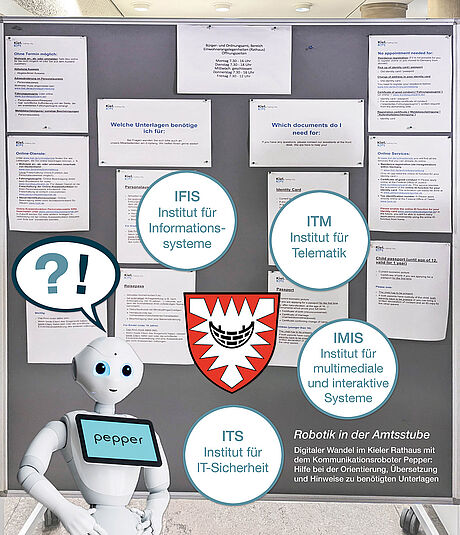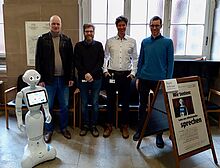DKDE-eGov: Danish-German research center for secure intelligent eGovernment
Funded by: The State of Schleswig Holstein – The Minister President – State Chancellery
Runtime: 01.07.2021 – 31.03.2024
Project Coordinators: Prof. Dr. Stefan Fischer (University of Lübeck) & Prof. Dr. Ralf Möller (Hamburg University) & Prof. Dr. Moreen Heine (University of Lübeck) & Prof. Dr.-Ing. Thomas Eisenbarth (University of Lübeck)
Research Associates: Edgar Baake (M.Sc., University of Lübeck) & Florian König (M.Sc., University of Lübeck) & Claudius Pott (M.Sc., University of Lübeck) & Thomas Sievers (Dipl. Ing., University of Lübeck)
Motivation
The Danish-German Research Center consists of three working groups: e-administration (e-government), security and data protection and artificial intelligence, which deal with various topics in their respective fields. The groups work closely together to find forward-looking solutions.
The Artificial Intelligence working group deals with research and application issues relating to intelligence in distributed information systems, which forms the technical basis of practically all modern eGovernment systems. The following keywords describe the issues to be addressed:
- Integration and exchange of data modeled with heterogeneous schemas
- Answering queries in virtual knowledge graphs (model-based query answering via federated databases)
- Integration of incomplete and uncertain distributed data
- Distributed and federated machine learning in combination with e.g. differential privacy principles
- Communication protocols for secure intelligent distributed systems
- Targeted and human-centered reasoning about customer support actions
Goals and Procedure
In order to implement eGovernment services, different types of databases must be integrated, either in materialized form (parts of the data are copied) or virtually (queries are distributed to data sources and only the results are copied to the target). In both cases, at least parts of the source data must be securely exchanged to ensure the completeness of the query response in a distributed environment.
Data to be processed in eGovernment services is often incomplete (missing information about whether someone has been abroad does not mean that the person has actually stayed in Germany the whole time) and uncertain (someone claims to have lived in Monaco long enough, but there is evidence to the contrary). Other examples can be found in the smart city context and data-driven governance, where not all relevant data is available for various reasons (e.g. data protection or organizational or technical accessibility). Incomplete and uncertain data pose new challenges when responding to queries. Models are needed to compensate for missing or uncertain information. However, the use of models requires learning so that the models keep pace with reality. When data is distributed in different types of databases (and can only be copied to a limited extent for security and privacy reasons), we need to implement machine learning algorithms over federated databases. Note, however, that federated learning requires the integration (and sharing) of information, at least for parts of the data, so new secure and privacy-preserving communication protocols need to be developed.
Innovation and Prospects
Based on the envisaged technology, new types of eGovernment services can be realized. An eGovernment service could be linked to a specific goal, e.g. to assist a customer (i.e. citizen or business) in managing certain application forms, and the service gathers information from various sources to interact optimally with the customer. The service anticipates the customer's goal(s), attempts to synchronize its own goals with the customer's goals while selecting information sources best suited to meet the goals, and interacts with the customer to provide optimal support, focusing on the information relevant to the task at hand. An intelligent eGovernment service selects optimal actions to interact with the customer in order to achieve its own and the customer's goals as quickly as possible, while providing background information as explanations possibly also for actions of human stakeholders involved in a given eGovernment service.
Project Partners
With the help of the humanoid communication robot Pepper, the City of Kiel's municipal office wants to drive digital change in the city hall and is working on new solutions from a practical user perspective together with the DKDE-eGov project group.




